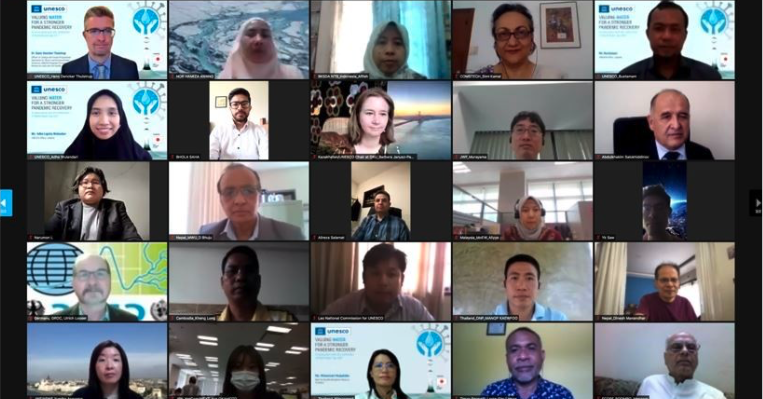Water experts from across Asia and the Pacific came together this week to share ideas on how the water community can contribute towards a stronger recovery from the COVID-19 pandemic. Better planning, technical innovation, water education, improvements in gender equality, and integrated watershed management were among the solutions proposed.
As part of a series of events organized in the context of celebrating World Water Day 2021, UNESCO Jakarta organized a regional experts’ discussion under the heading “Valuing Water for a Stronger Pandemic Recovery” on 20 April 2021, supported by the Government of Japan. The panellists suggested key elements be incorporated and considered for a stronger pandemic recovery.
With participation by over 50 members of the UNESCO water family, the online meeting introduced two case studies on water and COVID-19 – by the Regional Centre for Urban Water Management (Iran) and the UNESCO Chair at the Kazakh-German University (Kazakhstan) – along with regional perspectives on gender from COMSTECH (Pakistan) and watershed management at the Mae Sa-Kog Ma Biosphere Reserve (Thailand).
Opening the discussion, UNESCO’s Water Family leaders in the region – Prof. Zhongbo Yu, Vice-Chair of IHP UNESCO for Asia and the Pacific and Prof. Yasuto Tachikawa, Chair, Japan National Committee for IHP – expressed their expectation to have exchange and discussion towards a stronger pandemic recovery at this regional gathering.
The panellists delivered their presentations focused on the impacts of and response to the pandemic across different sectors. They recommended the need for new thinking as the region emerges towards a new normal. COVID-19 has brought the importance of adaptable planning to the fore. Better planning and management need to be advocated at all levels and sectors, including urban planning, business, education and research, as well as protected areas. Incorporating women’s perspectives, knowledge, and values in water management may also enhance the resiliency of planning and serve as a key enabler in a stronger pandemic recovery. The pandemic has necessitated an innovative reorganization of learning and teaching modalities in water education, demonstrated by how the COVID-19 crisis response has brought with it innovation and new thinking.
Dr Hans Dencker Thulstrup, Officer in Charge of UNESCO Regional Bureau for Science for Asia and the Pacific, promised that the key perspectives brought by speakers be further advanced and shared at two key UNESCO regional events held in late 2021 – the 13th meeting of the Southeast Asia Biosphere Reserves Network (SeaBRnet) and the 28th meeting of the IHP Regional Steering Committee for Asia and the Pacific (IHP-RSC).
Relevant Link: Video


Recent Comments